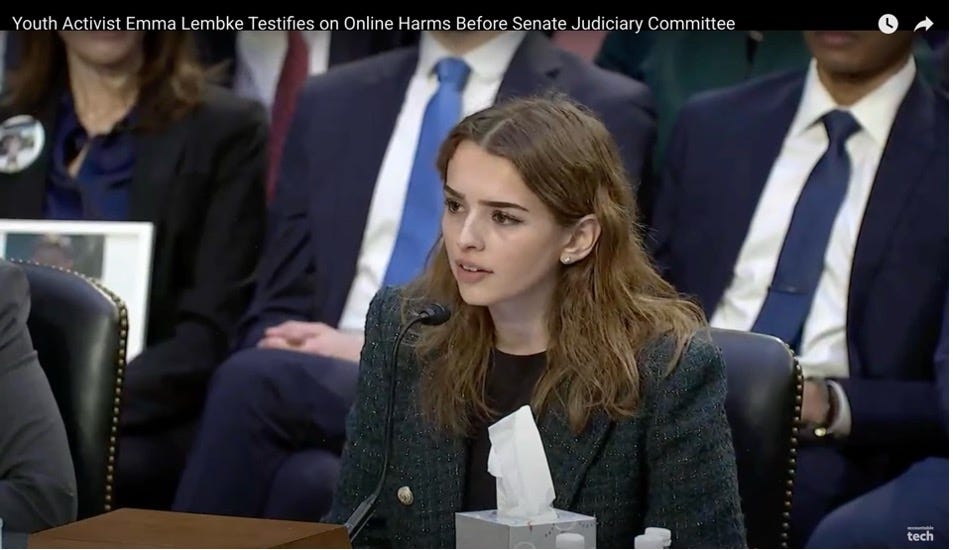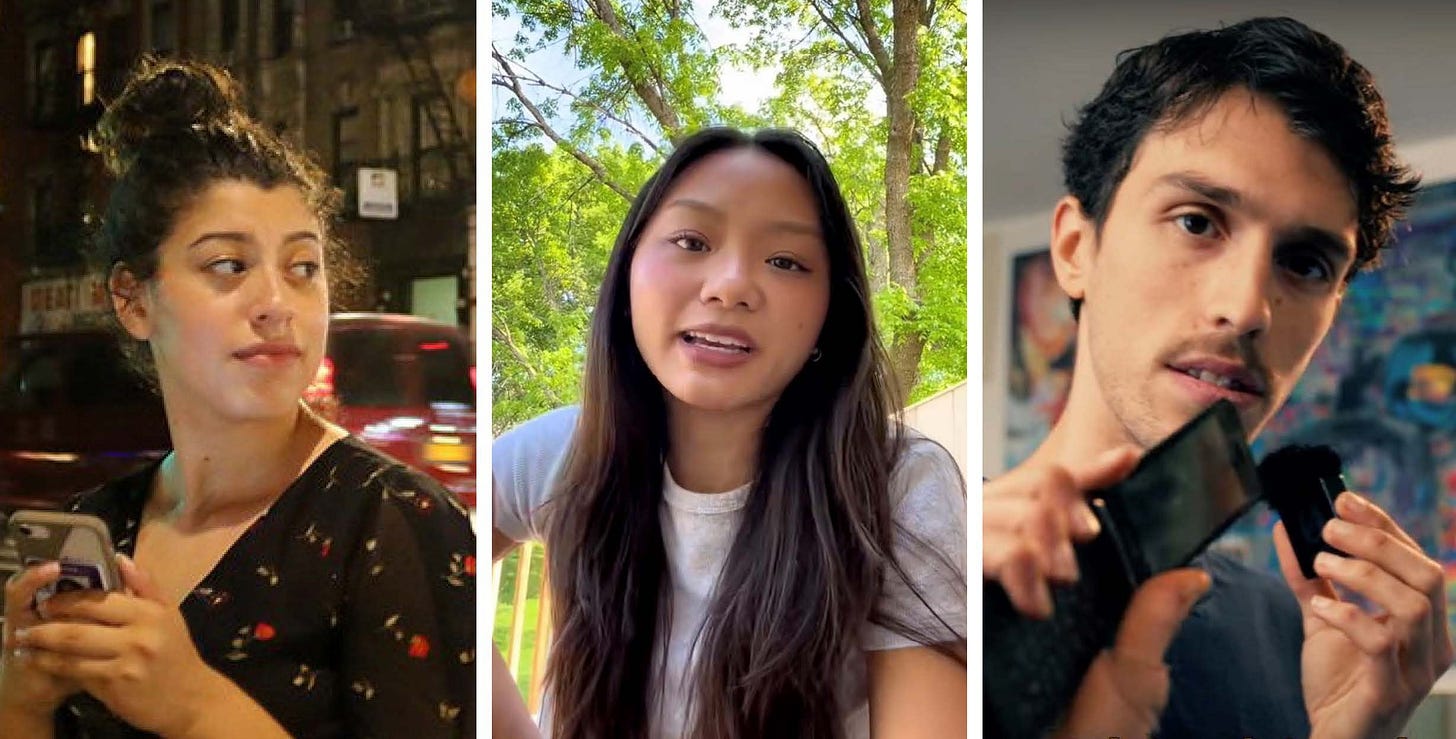Hello and welcome to new subscribers! I’m very grateful to all who read, share, or comment on my articles—and if you’re not a subscriber yet, please consider becoming one. It’s free(!) and helps support my work.
Izzie Ramirez, an editor in Brooklyn, said, “I realized that my phone was getting in the way of doing literally anything else.” So she tried a one-month experiment—swapping her smart phone for a “dumbphone,” a flip phone with no social media apps. The next thing she knew, her life was feeling fuller. She was meeting people in-person more often and calling her friends and mother more. As an added bonus, her attention span increased.
Quynh Van, a UX designer in Minneapolis, said her life was “disappearing into a scroll.” So she tried a more radical experiment—a four-year hiatus from all social media. Without the constant pressure to compare herself to others, she felt she became more authentic and interesting. And absent the need to numb herself with social media’s “dopamine hits,” she became more emotionally resilient too.
Cameron Dubé, an independent filmmaker in Ontario, said, “I felt like the phone was weighing me down, like there's constantly something to be attended to within my own pocket.” His solution, after accidentally dropping his smartphone in a lake, was to make a permanent switch to a flip phone. He said he loves how slow it is: “It doesn't hijack that part of my brain that just wants to see the next thing.” He added that, “Closing it is the most satisfying thing in the world now.”
What Ramirez, Van, Dubé, and countless other young people who have put down their app-laden smartphones (at least temporarily) have learned is that these devices can often…suck.
Indeed, study after study has shown how this “suckiness” begins at a young age. A 2023 review of eleven prior studies found that excessive smartphone and social media use among teenagers was associated with chronic sleep loss and an increase in mental distress, self-harming behaviors, and suicidal ideation. Another meta-study found that smartphone use was “associated with difficulties in cognitive-emotion regulation, impulsivity, impaired cognitive function, addiction to social networking, shyness and low self-esteem.” And a recent study of college students showed that “high levels of anxiety were correlated to an increased number of messages exchanged through social media applications.”
The Dumbphone Movement(s)
A growing consciousness of these ill effects has led to something of a rebellion among a small but significant cohort of Gen Zers and younger Millennials, i.e., those people most susceptible to smartphone dependency. “The smartphone is not a source of enjoyment anymore,” says Pascal Forget, a Canadian tech columnist. “It used to be fun, but now [people are] addicted to it, so they want to go back to simpler times using a simpler device.” The numbers bear this out. Flip phones and their dumbphone cousins—“feature phones” like the Light Phone 3 which offer a digital keyboard but still have minimal applications—now represent a small but solid segment of the mobile phone market, with 16% of adult Gen Zers owning one. Even the BlackBerry, that clunky relic of the 2000s, is making a comeback as a smartphone replacement.
Of course, substituting one technology for another technology is often just substituting one problem for another. This is something Sean Killingsworth found out at his Florida high school a few years ago. The incessant virtual socializing was leaving him feeling anxious and unproductive, so he ditched his smartphone for a flip phone only to encounter another problem: isolation. “Because,” he said, “what I discovered was no one was socializing in the real world anymore.” So he started the Reconnect Movement, a network of college clubs hosting phone-free events like painting, hiking, listening to music, or just hanging out so that people can “skip the online eggshells and experience conversations, laughter, and real connection in person.”
Killingsworth’s movement is still pretty small (it’s limited to three universities in Florida and a few hundred students), but it’s one of several other “movements” that have popped up in recent years.
The Log Off Movement, for example, was co-founded in 2020 by then-high school senior Emma Lembke after suffering anxiety, depression, and eating disorders from her exposure to a toxic online environment. Log Off is primarily an advocacy organization built around the idea of responsible tech (“the re-prioritization of our humanity and our own agency over profitable technological development”). This advocacy can look like anything from an earnest campaign to dissuade people from having their phones out at mealtimes to Lembke herself testifying before the U.S. Senate Judiciary Committee and warning that unregulated social media was a “weapon of mass destruction.”

Another group, Appstinance, was started at Harvard by grad student Gabriela Nguyen, after realizing how much her smartphone and social media addiction was harming her. The group bills itself as: “A place for Gen Z to…bring a voice to youth who do not use or would like to stop using social media, and guide those who generally want to decrease its hold over their lives.” To do this, they promote a “5 D Method” (Decrease, Deactivate, Delete, Downgrade, Depart) to wean people off harmful platforms. They also promote education on the negative effects of media technology and advocate educational policy changes like phone-free schools.
A Touch of Irony
Appstinence also practices what it preaches in that it doesn’t have any social media accounts and instead communicates with members via its website and an occasional email. This makes it something of an outlier. One of the ironies in researching this article was that I got some of my best information from…wait for it…social media! I even discovered a group that hosts phone-free events in several cities around the world called The Offline Club. It has over 500,000 followers on Instagram.
This might seem hypocritical, but it speaks to the complex love/hate relationship many of us have with technology. For example, all three people I citied at the outset have noted their difficulty in resisting the online world:
Izzie Ramirez (who tried to go a month without her smartphone) said: “I fell two days short, thanks to [a] sporadic trip to Puerto Rico. I had to order Ubers, consult spreadsheets, figure out access codes, find restaurants that everyone actually wanted to eat at, and keep in touch with people we were hanging out with.”
Quynh Van (who took a four-year break from all social media) confessed that the “toxic mentality of just always feeling behind and comparing myself to everyone” had sort of returned after she rejoined TikTok.
And Cameron Dubé (the filmmaker) admitted: “I still have a smartphone, an old smartphone. I even bought myself a tablet.”
Dubé, at least, was able to alter his behavior. His smartphone and his tablet, he said, “don't leave the house with me, they aren't in my pocket, and I don't have any communication apps or any social media or anything installed on them. They're strictly productivity devices.”

This struggle to find a balance between the legitimate utility of smartphones and the addictive nature of their applications was something I encountered over and over as I watched video accounts of teens and twenty-somethings who tried to reset their relationship with this technology. (See, for example, this one and this one, each of which has received hundreds of thousands of views within the past year.) But out of this struggle, an encouraging theme emerges. After an initial period of adjustment (the word “detox” gets thrown around a lot), there is a process of recovering what had been lost. There is a reappreciation of nature, of silence, of books, of cooking, of meaningful conversations with physical human beings. No wonder a recent survey of young Britons showed that half would have preferred to grow up in a world without the internet.
A Rebellion, Not a Revolution
Just to be clear—there is no revolution going on here. Smartphones continue to dominate the mobile phone market by a large margin and will continue to do so. This is not necessarily a terrible thing. In that same 2023 systemic review I cited above, the authors tempered their negative findings by noting that “ethical social media use can expand opportunities for connection and conversation, as well as boost self-esteem, promote health, and gain access to critical medical information.”
The key word there is, of course, “ethical.” And yet, American society is currently under the domination of a right-wing federal government that is particularly hostile to the kinds of institutions—courts, public agencies, journalistic news outlets, schools and universities—that are best positioned to advance the ethical use of technology. This means that, at least for the next three and a half years, any meaningful policy changes will probably need to come at the state and local level. (And even those levels are under attack. It was only two weeks ago when, by the margin of a single vote in the U.S. Senate, Big Tech failed in its latest effort to stifle state-level regulation.)
As Emma Lembke said of her generation during her congressional testimony:
“[W]e share the frustration of being portrayed as passive victims of Big Tech. We are ready to be active agents of change rebuilding new and safer online spaces for the next generation… We want to build it differently; we want to build it right.”
Armed with flip-phones, advocacy groups, social clubs, and a visceral desire to reconnect with the real world, a small but determined army is growing beside her.






Really enjoyed this! I have not one, not two… but unfortunately, three phones due to work and I will be swapping them out for a flip phone. I deleted all socials last week. I am beyond determined to get my life back
Great article and assessment of current times. It's good to know there are various groups out there for people to join to take a break from tech and try to be more disciplined in using it. I have a Boomer friend who only has a flip phone and never purchased a smart phone for the very reason cited in your article - to interact in the real world without the tech distraction. I communicate with him by calling or sending an email, or by texting his wife. So his wife is his social secretary, to some degree, using a smart phone. Some irony here.